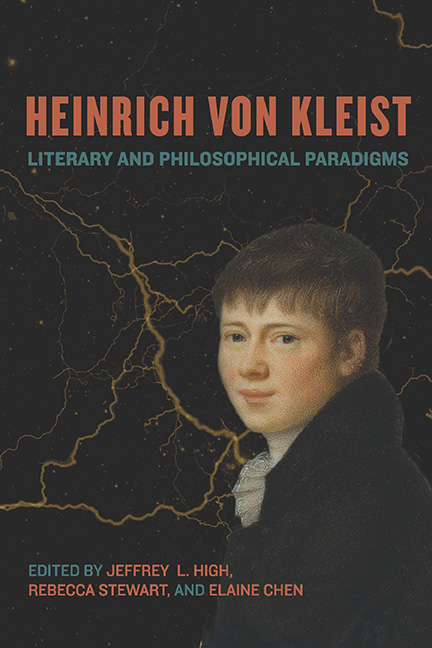4 - The Old and the New: Christoph Martin Wieland and Kleist on Parteigeist
Published online by Cambridge University Press: 26 May 2022
Summary
Alle Verbesserung im Politischen soll von Veredlung des Charakters ausgehen.
—Schiller, Ästhetische Briefe, 9. Br.[All improvement in the political sphere is to proceed from the ennobling of character.]
ONE CAN SCARCELY conceive of two authors who were seemingly more diametrically opposed. Christoph Martin Wieland (1733–1813) had everything Heinrich von Kleist (1777–1811) wanted: family, farm, fame, financial security. Composed and orderly, Wieland hardly traveled anywhere, except in his imagination. He moved to Weimar in 1772 and remained there and in its environs until his death in 1813, the head of a large family. He was one of the most celebrated and influential German writers of the Classical era. Kleist was nowhere at home and was not aligned with any particular literary school. He was constantly on the move, desirous of the fame and acceptance that eluded him, tumbling from one crisis to another: a Kantian crisis, a creative, and an existential crisis. Although he penned innovative works of all kinds, he had little success in his lifetime. They met once. Wieland invited Kleist into his home for six weeks in the winter of 1803 and offered solace as well as recognition of his dramatic talent when others in Weimar ignored him. Wieland provided an account of that sojourn in a letter dated April 10, 1804 that early on revealed Kleist's “erratic” behavior.
The old and the new in the chapter's title is multivalent. It refers to the age difference between Wieland and Kleist, the difference in their writing styles, and the difference in their aesthetic concepts. It also refers to the difference in their reactions to the French Revolution (1789–99) and its ultimate aftermath, the Napoleonic Wars (1803–15). Wieland reacted primarily to the former, Kleist to the latter. Wieland was a well-informed, astute observer. Although engaged, Kleist often misjudged situations. The Parteigeist (partisanship) in the chapter's title refers to the attitudinal change occasioned by the Reign of Terror (1793–94). Wieland represents the “old” view of Enlightenment cosmopolitanism and is viewed as a forerunner of the ideals of the European Union, whereas Kleist embodies the “new” view of the end of Enlightenment optimism and can be seen as a precursor of a twentieth-century irrational approach to political questions (Craig, 61, 66, 75).
- Type
- Chapter
- Information
- Heinrich von KleistLiterary and Philosophical Paradigms, pp. 96 - 117Publisher: Boydell & BrewerPrint publication year: 2022



